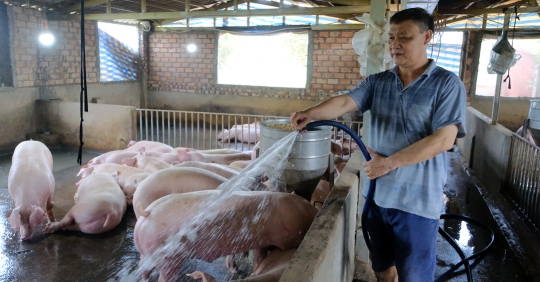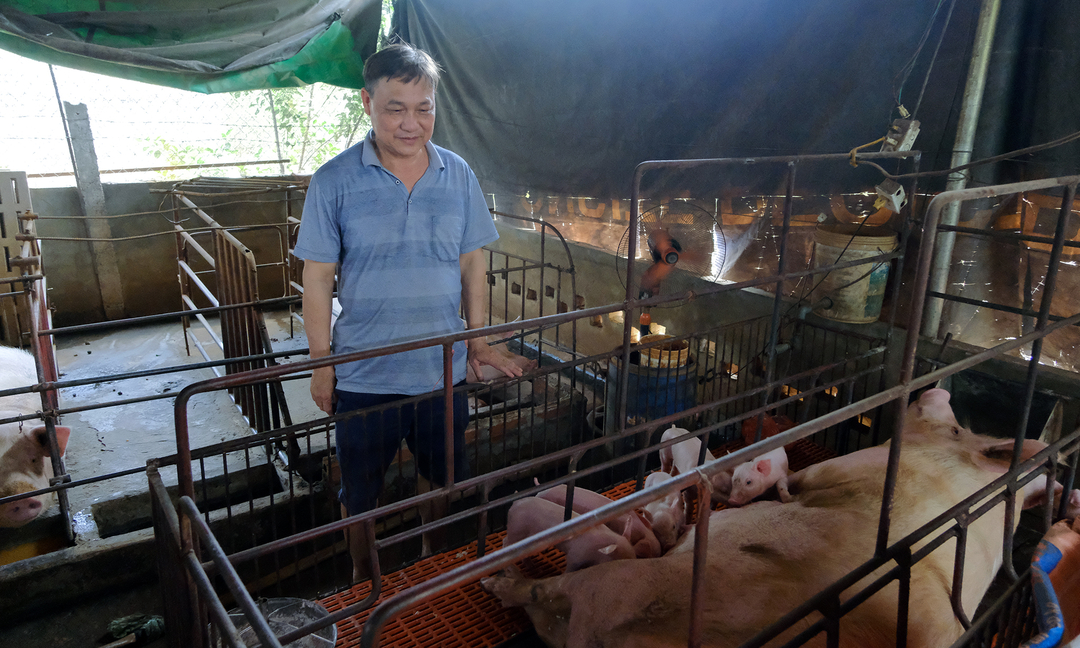
Mr Le Viet tested the ASF vaccine on pigs on a domestic scale. Picture: Bao Thang.
The light of domestic pig husbandry sees
“African swine fever,” with just these few words, the farmer in Dich Trung Village, Phuong Dinh Township, Dan Phuong District, Hanoi, was shocked.
When the disease broke out a few years ago, many small farmers in the area cried because infected pigs could not be cured. Dozens of kilometers along the Song Phuong Dike have buried many people’s tears here.
Most recently, at the end of 2022, African swine fever broke out again, leaving many farmers in empty cages. Economic loss is one thing, the main problem being that farmers are afraid to re-breed their herds as vaccines, the main weapon of prevention, are only distributed and used under controlled conditions in certain areas of the country. In addition, specific drugs for the disease are not yet available, and the transmission route of the disease is complicated and difficult to control.
Like many other breeders, Mr. Le Viet The, who lives in the village of Dich Trung, is very close to African swine fever. As a person with decades of animal husbandry experience and knowledge and expertise in veterinary medicine, the owner of a pig farm with more than 100 pigs strictly implements biosecurity in animal husbandry while monitoring and improving pig resilience.
“As of 2020, almost 90% of pig farms in Phuong Dinh were infected, the pens were completely destroyed. In order to protect the herd of pigs, there was no way the breeder had to let strangers into the farm,” confided Mr. The.
The epidemic has caused grief to many people, but it was also an opportunity for Mr. Le Viet The to showcase his talent. Over the years there has not been a single infected pig on his farm. The whole breeding area is still like a steel shield, helping the pig herd to grow healthily.
When asked about the secret of breeding to achieve such an effect, the 60-year-old just laughed and invited me to tour the field. Apparently aware of the hesitation, Mr The encouraged: “I used to not let strangers in. Even I myself have to disinfect, wear boots, wear protective clothing every time I enter and leave the agricultural area…” But now you can rest assured that you can visit us.
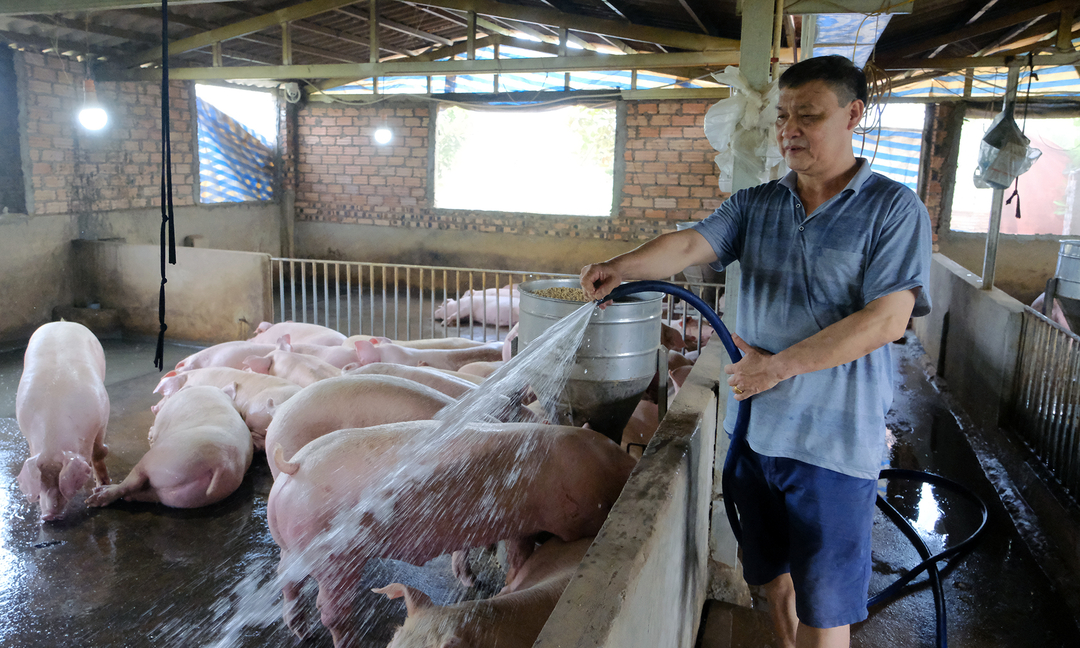
Mr. The is very active in cleaning the barn, ensuring a disease-free farming environment. Picture: Pham Hieu.
With his words and actions, Mr. The quickly made his way and guided me to his clean, hygienic breeding area. It was sunny outside in early May, but the air in the barn was still cool thanks to the multi-layer insulation system of tarpaulin and foam placed all around. In particular, when passing a few tens of meters from the outside to the inside, there was no smell at all.
Animal production in our country is still low. The proportion of households is quite high. As farm households are intertwined in residential areas, they also face the challenge of preventing and stopping the spread of disease due to the large “open” farming environment. Mr. The is aware of these problems and advocates “four nos”.
One of them is not to buy pigs of unknown origin without a transport quarantine certificate from the veterinary authorities. Second, take the initiative to maximize the source of disease-free breeders from the broodstock. Thirdly, do not collect food from restaurants or commercial kitchens, because if it is to be taken away, it must be carefully heat treated. Fourth, do not use untreated water from ponds, lakes, canals and ditches for bathing and feeding pigs.
Thanks to drastic and synchronous measures, ASF had to falter in front of Mr. The’s family business. However, based on his many years of breeding experience, the farmer is convinced that he needs a vaccine to have complete peace of mind, especially after witnessing firsthand the devastating effects of African swine fever on neighboring farms.
Upon learning that the AVAC Vietnam Joint Stock Company was testing an African swine fever vaccine, Mr. The contacted the company and suggested allowing testing for the farm.
“A lot of people call me crazy. But since the injection in July, August 2022, the effect is very clear. My pigs are still immune to African swine fever,” he said excitedly.
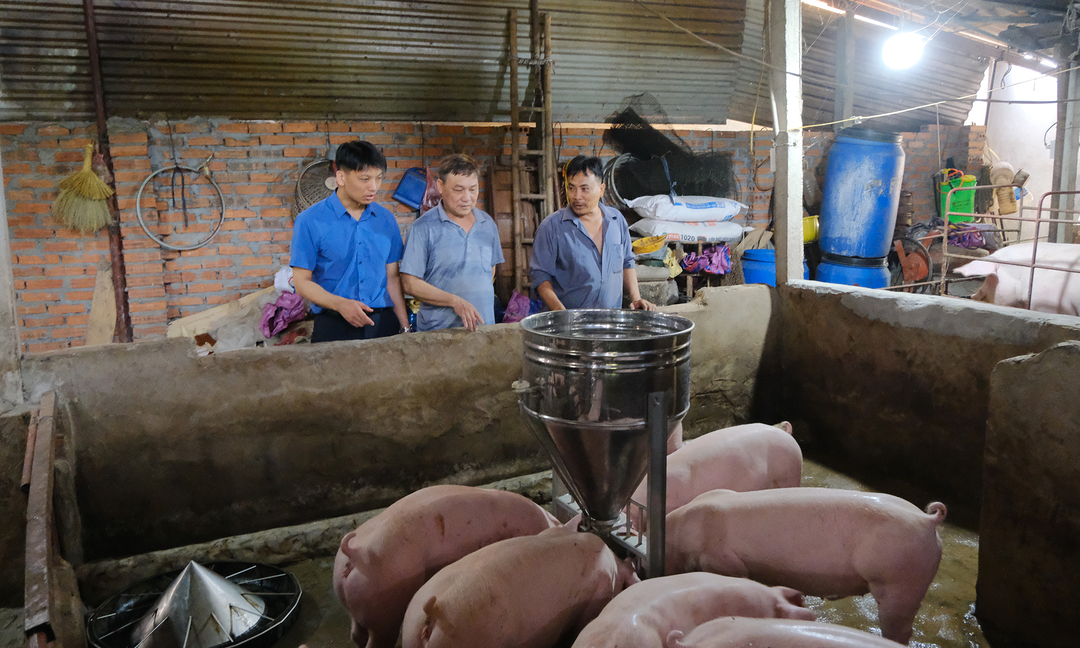
Mr. Nguyen Van Diep, General Manager of AVAC Vietnam Joint Stock Company, and Mr. Le Viet shared experiences and reviewed the situation of pig herds among farmers after vaccination against ASF. Picture: Bao Thang.
Visit us actively and monitor regularly
It is not a short way from determination to action. In the village of Dich Trung, many small and small farmers are looking forward to a vaccine, but not everyone dares to “take the three spades first” (says one homeowner) like Mr Le Viet The.
A few hundred meters from Mr The’s house, Mr Pham Manh Tien once lost all his pigs during the outbreak of African swine fever last year. On the occasion of the recent Lunar New Year, the prices of pigs rose, but Mr. Tien was still reluctant to return to the herd for fear of the white stall from the renewed epidemic.
It wasn’t until Mr. The’s family’s second batch of vaccinated pigs were healthy that Mr. Tien rebuilt his business. From the first few pig heads, his pen is now filled with about 50 pigs.
“The new herd were also very concerned but I believed in vaccines and believed in Mr The’s advice. I was brave As a result, my pigs are now healthy and ready for sale.” Mr. Tien confided.
Also in Dich Trung village, but with a smaller group of about 30 children, Mr Nguyen Van Hai said, “It’s okay to sleep at night.” Since livestock farming is the family’s main source of income, Mr Hai almost had to lose his job during the epidemic into the streets to earn a living, and then animal feed prices continued to rise. It wasn’t until he saw that the pigs were growing as well as they are now that Mr. Hai breathed a sigh of relief.
Mr. Tien and Mr. Hai are two of more than 30 farming households in Phuong Dinh Municipality mobilized by Mr. The to inject the AVAC ASF LIVE vaccine manufactured and supplied by AVAC Vietnam Joint Stock Company. A total of around 1,300 pigs have been vaccinated to date. All are closely monitored before, during and after the injection. The result is that 100% of the pigs are healthy and not infected after the injection.
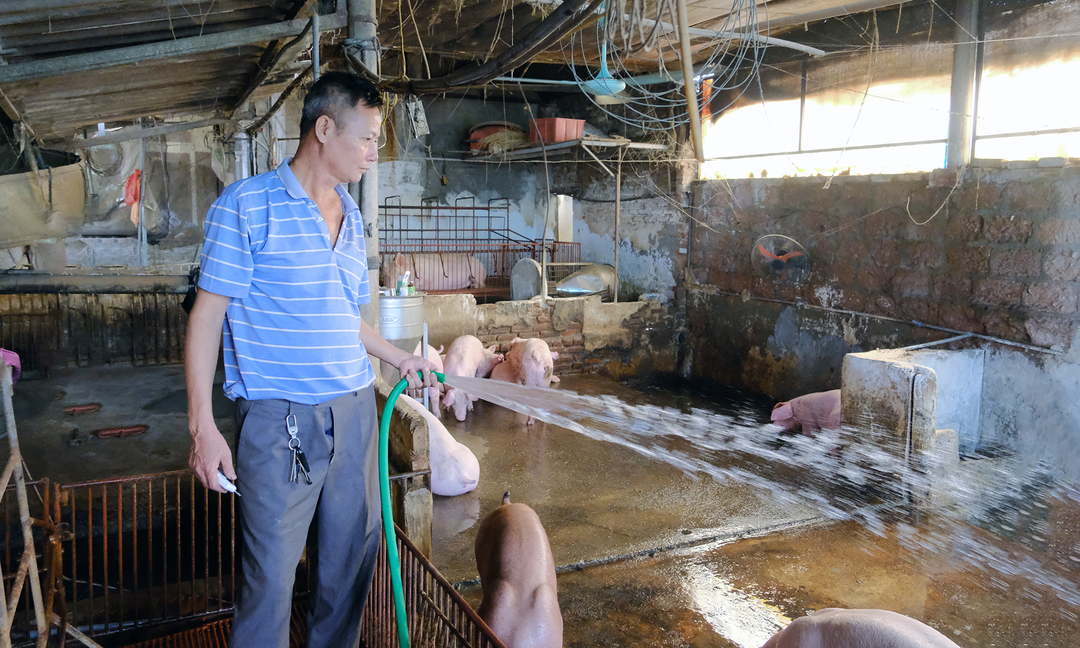
Mr. Nguyen Van Hai has been assured of recovery since using the AVAC ASF LIVE vaccine. Picture: Pham Hieu.
Based on the above results, Mr. Le Viet continued testing the AVAC ASF LIVE vaccine on sows and piglets based on the dose prescribed by the AVAC Vietnam Joint Stock Company.
After the injection of 2 litters, according to Mr. The, the fertility of the sow hardly changed, the piglets grow quickly. Test results 3 to 4 months after injection in both sows and piglets showed that the pigs still had antibodies. This is consistent with AVAC’s claims that the duration of protection of vaccines is around 4 months.
Mr The revealed the secret to keeping pigs healthy after vaccination, saying: ‘The most important thing is to buy a standard vaccine and not off-the-shelf goods. I always order directly from the company and carefully check packaging, labels.” , Preservation methods upon receipt”.
Testing of ASF vaccine on smallholder farmers is one of the important steps to assess the real effectiveness of the vaccine. In the instructions since 2022, when Vietnam first announced the successful production of this vaccine (Navetco Company), the Ministry of Agriculture and Rural Development and the Ministry of Animal Health always emphasized the need to obtain the maximum benefit for farmers.
Recently, AVAC Joint Stock Company has shipped and tested more than 700,000 doses of AVAC ASF LIVE vaccine to 32 provinces and cities. In early February 2023, the Ministry of Agriculture and Rural Development delegation, led by Deputy Minister Phung Duc Tien, inspected a CP Vietnam Livestock Joint Stock Company system processing plant that has been operating vaccinated AVAC ASF LIVE since late 2022 and gave positive results Results.
Mr. Nguyen Van Diep, General Manager of AVAC Vietnam Joint Stock Company, said: “In the coming period, we will continue to improve technology and research to further improve the protective effect of vaccines and optimize prices to target both sows and piglets who follow the mother.”
In addition to the correct injection technique and dosage according to the company’s recommendations, Mr. Le Viet emphasized regular monitoring of the pigs within 2 weeks after the injection. He estimated that vaccinated pigs often have more fever in the second week. Therefore, it is necessary to avoid subjective psychology when seeing pigs with mild reactions in the first week. In addition, the breeder must give the pigs antipyretic electrolytes for 15 days and notify them immediately of any abnormalities.

